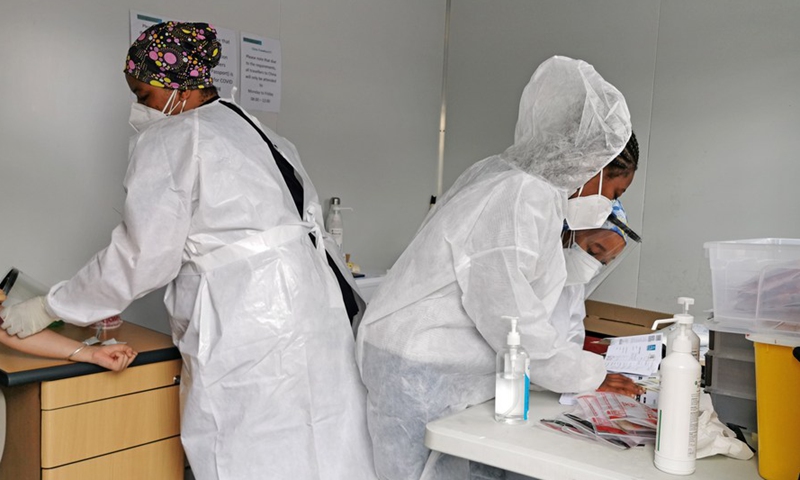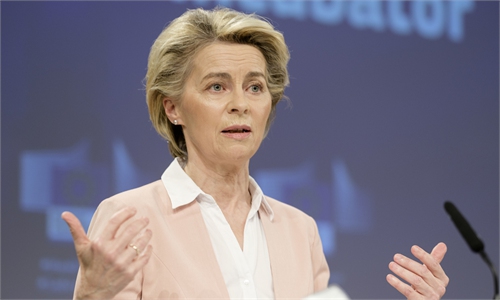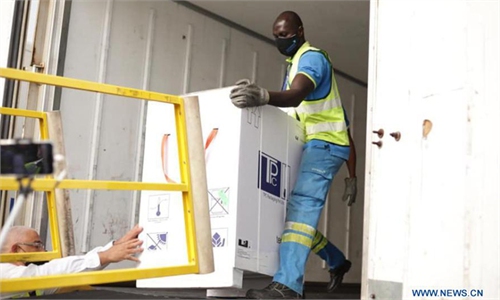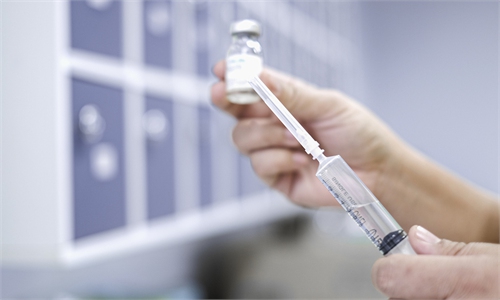CORONAVIRUS
China and Russia help address vaccine shortage in developing nations given Western countries absence
Help address shortage in developing nations given Western countries absence

Medical workers go about their business at a COVID-19 test point in Johannesburg, South Africa, on Feb. 1, 2021.Photo:Xinhua
More African countries are starting to roll out COVID-19 vaccination programs with the arrival of China-donated vaccines. Observers said that China has played a crucial role in addressing the uneven global vaccination situation, and with more Chinese vaccines making progress, the country's production capacity can satisfy both domestic and overseas demand.
A spokesman for Zimbabwean President Emmerson Mnangagwa said on Wednesday that the southern African country will buy an additional 1.2 million COVID-19 vaccine doses from China at a preferential price, after Beijing agreed to provide more free doses.
The same day, Namibian President Hage Geingob lauded China and other countries that have extended help with donations in the form of COVID-19 vaccines to Namibia and other African countries to improve the fight against the devastating pandemic.
Zhao Lijian, spokesperson of China's Ministry of Foreign Affairs, said on Thursday that China is providing COVID-19 vaccine assistance to 53 countries and exporting its vaccines to 27 countries.
Chinese donated and exported vaccines have arrived in countries such as Mongolia, Egypt and Singapore.
Africa has recorded more than 100,000 COVID-19 deaths, and it is rolling out its vaccination program after a slow start. The Lancet said in a paper that mass vaccination campaigns could begin in Africa in March, yet there are concerns over equitable access to the vaccines.
When talking to French media, Senegalese President Macky Sall said that the reason he chose Chinese vaccines is that as developed countries started vaccination programs, the COVAX alliance did not yet have vaccines, and he could not simply wait for the vaccines to arrive.
On February 17, UN chief Antonio Guterres criticized the "wildly uneven and unfair" distribution of COVID-19 vaccines, pointing out that just 10 countries had administered 75 percent of all vaccinations.
Chen Xi, an assistant professor of public health at Yale University in the US, said that the shortage of vaccines in developing countries is a tricky problem, especially as the Southern Hemisphere, where some of the worst-hit countries are located, is going into its winter season.
"Those countries must kick off mass inoculation programs before June and avoid any viral spread. Otherwise, the global pandemic will be prolonged," said Chen.
Chen said it is difficult to have mass vaccination programs in those countries as they are short of vaccines. "That's why the Chinese and Russian vaccines play a key role in solving this problem."
In order to compete with China in the vaccine donation field, French President Emmanuel Macron said on February 19 that Europe and the US should urgently allocate up to 5 percent of their current vaccine supplies to developing countries, where COVID-19 vaccination campaigns have scarcely begun, and where China and Russia are offering to fill the gaps.
Yet health experts pointed out that even if Western countries want to help, they themselves still face vaccine shortages.
US Centers for Disease Control and Prevention data showed that only 13.1 percent of the 330 million US population have been inoculated, and many are struggling to get second shots due to supply shortages. Chen said that only after July, when an estimated 300 million people in the US get vaccinated, will the US be able to spare doses for developing countries.
Some foreign media, including The Economist, questioned whether China's production capacity can meet its domestic and oversea demand.
China's two biggest vaccine producers - Sinopharm and Sinovac - told the Global Times previously that they can elevate their production capacity to 1 billion doses each this year.
A Beijing-based immunologist told the Global Times on condition of anonymity that the 2 billion doses will be enough for China, whose plan now is only to inoculate people aged between 18 to 80 at home and then export vaccines.
"Not to mention that other Chinese vaccines are making great progress recently, with a protein subunit COVID-19 vaccine to enter clinical trials. This can help increase the country's vaccine supplies," said the immunologist.
He said that the recombinant subunit vaccine can be an important addition to the two Chinese inactivated vaccines already in mass production, considering its shorter production process, and although no production capacity data was published by CanSino, its one-shot plan can also help solve vaccine production problems.




